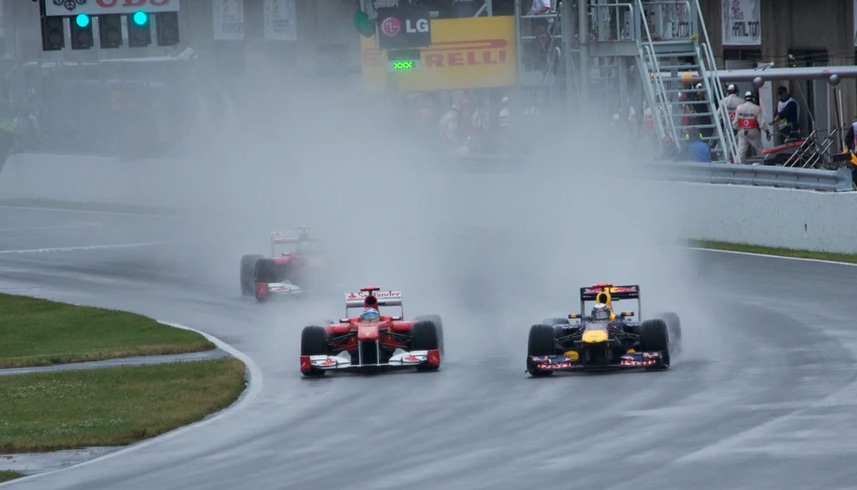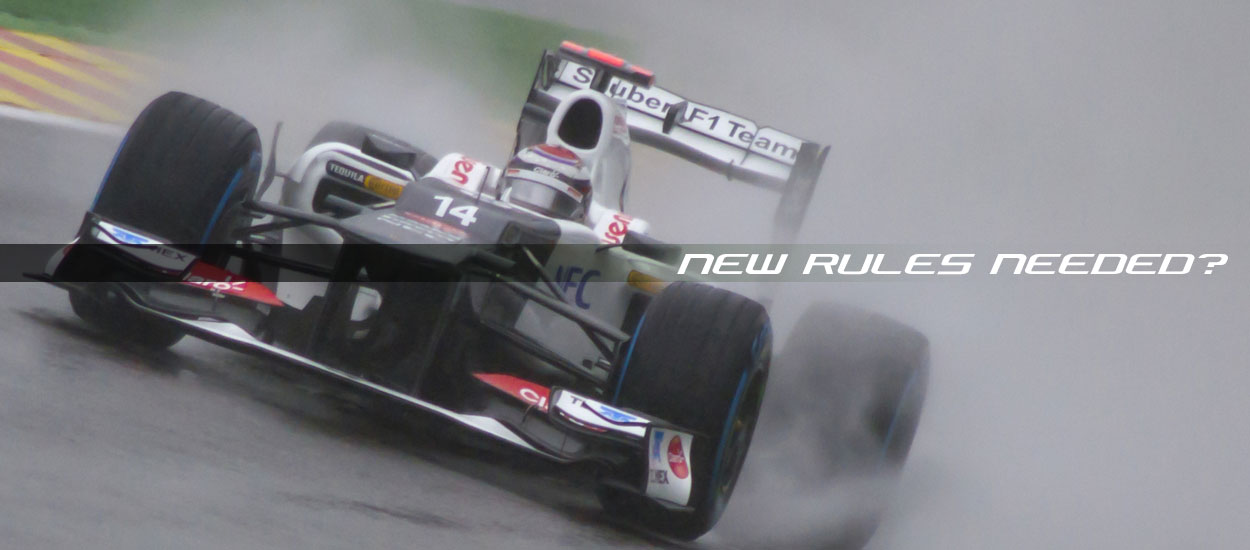Results of the Belgian Grand Prix frustrate bettors
Sunday’s Belgian Grand Prix was "a farce", as stated by F1 driver Lewis Hamilton, as torrential rain made it impossible for the cars to run a real race. After running behind the safety car for four formation laps at the beginning of the race, the cars were pulled off the track and fans, drivers and TV viewers had to wait over two hours for anything to happen. Realizing they were never going to get a competitive lap in, the drivers raced for just two laps (which did count) behind the safety car, simply so the race could be classified, and half points could be awarded. The race was then called. Formula 1 officials said they went back believing they could get some real racing in, but the drivers, media and fans all knew it was simply so they could award points, since the weather at the time they went got back on the track was as bad as any other time during the day. While most auto racing series would have either cancelled the race, run it the next day or had it race later in the year, F1 decided it was more important to pretend they had a race, so they didn’t have to reschedule it or refund ticket buyers. F1 officials also said that running the following day wasn’t an option. "Money talks and the two laps to start the race is all a money scenario," Hamilton said in an interview after the race.
Formula 1 officials said they went back believing they could get some real racing in, but the drivers, media and fans all knew it was simply so they could award points, since the weather at the time they went got back on the track was as bad as any other time during the day. While most auto racing series would have either cancelled the race, run it the next day or had it race later in the year, F1 decided it was more important to pretend they had a race, so they didn’t have to reschedule it or refund ticket buyers. F1 officials also said that running the following day wasn’t an option. "Money talks and the two laps to start the race is all a money scenario," Hamilton said in an interview after the race.
As much as the decision was a disappointment to fans and drivers, it was either a complete disaster or windfall to anyone who bet on the race. Two sportsbooks, BetOnline and FanDuel refunded losing bets but almost every other sportsbook, including all the European books, paid out the bets as if it was an actual, real race. Consequently, bets placed on the following markets amounted to free money for bettors and a catastrophe to sportsbooks. That included 200/1 odds on Nikita Mazepin for fastest lap:
- Max Verstappen to win
- Verstappen, Lewis Hamilton, or George Russell for podium finish
- Those three plus Daniel Ricciardo, Sebastien Vettel, Pierre Gasly for top 6 finish
- Those 6 plus Esteban Ocon, Charles Leclerc, Nicolas Latifi and Carlos Sainz for points finish
- Red Bull as the winning constructor
- Max Verstappen and George Russell for dual finish
- Nikita Mazepin for fastest lap
- Yes, for their being a safety car
- No retirements in the race
- Any driver to be classified
- Over 17.5 finishers in the race
- Winning margin under 1 second
To anyone who bet anything else, they lost their bets. Wagers on leader after five laps, leader after 10 laps and first driver to pit were voided. The big problem for bettors, of course, is that since a competitive lap wasn't run, bets on anything but the above stood no chance to win.
As one UK poster on social media lamented "This is like having NASCAR run 2 laps behind the pace car and then the race being declared official based on how they lined up. If NASCAR did that there would be rioting in the stands and losing bettors would be lining up at sportsbooks demanding their money back. But for some reason in Europe we just accept getting screwed over."
I asked Bet365 how it was fair to grade a bet as a loser when it was impossible for the bettor to win the wager and here was the response I received:
'Our rules state "All race bets are settled on the official classification from the Federation Internationale de l'Automobile (FIA), the sport's governing body, at the time of the podium presentation."
To locate our Sports Rules, scroll to the bottom of the site, click Rules and select a sport of your choice. If you have any further queries don't hesitate to contact us again.
Kind regards'
While Bet365 is right that they followed their rules, it doesn't change the fact that the rules are an ass. The markets were unfair to anyone who bet after qualifying on any losing bet because they had no chance to win their wagers, to void their bets before the start, or to appeal the decision to any ombudsman or company official since technically nothing wrong was done. Thus, the question must be asked whether it’s more important to adhere to the results of the governing body or to create betting rules which ensure fairness.
In many other sports, books have decided to implement their own rules to protect themselves and bettors that often are different than the official results of the governing body.
In tennis for example, most sportsbooks have implemented a rule that at least two sets must be completed for results to count for betting purposes, and some books have even required the full match to be completed for action. This was declared a necessary rule after it was recognized that unscrupulous players could pretend that they were injured and walk off the court, thereby effectively throwing the match. It happened a few times and after numerous complaints about the fairness of the match sportsbooks relented and put in the new rule. So, even though the ATP and WTA deem the results official, even if a player quits before one set is played, betting shops have a different criterion for betting. And in baseball, any bets on the total runs scored requires a game to go at least 8.5 innings (6.5 in a double header game) for action since books have deemed that it’s not fair to the over bettors (or to themselves on the under), to have a wager settled on any game that doesn't go the full scheduled innings as the bet is made and accepted based on the assumption it would go the allotted number of innings. And there are numerous other examples of rules on sports put in by sportsbooks that go against the "official results of the governing body" since in those sports it seems the fairness of the wager is paramount. This also isn't the first time that F1 has had situations that have caused an uproar and disenfranchised bettors. In the 2002 Austrian Grand Prix, Rubens Barichello had a big lead heading to the finish line, but he let Michael Schumacher pass him on team orders, resulting in any Barichello bettors losing their wager. While some sportsbooks at the time paid out Barichello bettors as a goodwill gesture, most simply graded it as is. And perhaps the biggest shemozzle was at the 2005 U.S. Grand Prix when it was determined that the Michelin tires wouldn't hold up in race conditions. Teams racing on Michelin tires asked for a chicane to be put down to slow teams up and/or to allow them to change tires to Bridgestone. F1, however refused and as a result only six cars raced. This included Michael Schumacher and Rubens Barichello, who used Bridgestone tires for Ferrari, and the four worst drivers in F1 who ran for Jordan-Toyota and Minardi-Cosworth that also used Bridgestone tires. It was an absolute disaster that forced the speedway to refund ticket costs to fans, which almost every analyst agreed was only done because U.S. fans would have rioted otherwise (they did litter the track with garbage during the race), and it effectively spelled the end of the U.S. Grand Prix for a decade. To make matters worse, F1 then blamed the Michelin teams and tried to fine them and F1 defended their decision not to allow teams to use Bridgestone tires because it "clearly violated the rules against using wrong equipment" and they said the chicane altered the track too much and wasn't tested, although it was clear to everyone that the only fair thing to do was to create an exception under unique circumstances.
This also isn't the first time that F1 has had situations that have caused an uproar and disenfranchised bettors. In the 2002 Austrian Grand Prix, Rubens Barichello had a big lead heading to the finish line, but he let Michael Schumacher pass him on team orders, resulting in any Barichello bettors losing their wager. While some sportsbooks at the time paid out Barichello bettors as a goodwill gesture, most simply graded it as is. And perhaps the biggest shemozzle was at the 2005 U.S. Grand Prix when it was determined that the Michelin tires wouldn't hold up in race conditions. Teams racing on Michelin tires asked for a chicane to be put down to slow teams up and/or to allow them to change tires to Bridgestone. F1, however refused and as a result only six cars raced. This included Michael Schumacher and Rubens Barichello, who used Bridgestone tires for Ferrari, and the four worst drivers in F1 who ran for Jordan-Toyota and Minardi-Cosworth that also used Bridgestone tires. It was an absolute disaster that forced the speedway to refund ticket costs to fans, which almost every analyst agreed was only done because U.S. fans would have rioted otherwise (they did litter the track with garbage during the race), and it effectively spelled the end of the U.S. Grand Prix for a decade. To make matters worse, F1 then blamed the Michelin teams and tried to fine them and F1 defended their decision not to allow teams to use Bridgestone tires because it "clearly violated the rules against using wrong equipment" and they said the chicane altered the track too much and wasn't tested, although it was clear to everyone that the only fair thing to do was to create an exception under unique circumstances.
As with the Belgium Grand Prix, they may have been following the rules, but it was a disaster for bettors and sportsbooks, and it turned many bettors off F1 for quite some time. Because the teams ran the formation lap, all bets counted per sportsbook rules and F1 rules, and anyone who bet on Schumacher to win, Barichello for a podium or Tiego Monteiro for a podium, they were laughing all the way to the bank. Similarly, anyone who bet on the other also-rans namely Narain Karthikeyan, Cristijian Albers or Patrick Friesacher for top 6 finish, they also raked in the dough. It should be noted that none of the drivers finishing 3rd to 6th ever finished in the points in another F1 race and most of the time they retired due to inferior equipment or bad driving. And at the time Ferrari were a second-rate team and the odds-on Schumacher were quite high before the race. But as much as the bettors were hurt by the F1 decision, books were hurt far more. It was estimated that UK sportsbooks lost millions on the event since some fans bet on Schumacher and the lousy Bridgestone drivers after getting a tip that the Michelin drivers wouldn’t race, and they figured the huge reward was worth the risk.
That event led to most of the biggest U.S. facing books like The Greek, BookMaker, and Heritage Sports to change the rules declaring that the formation lap doesn’t count for betting purposes at their sportsbooks, and they also put in a rule that at least half the scheduled cars had to start for action. At the time, The Greek defended the decision to have different rules saying that any rule had to be based on fairness and common sense. European books, however, have stuck with their ruling that as long as the formation lap is run, the race counts for betting purposes. In addition, from what I have been told, Formula 1 is partially responsible for insisting that sportsbooks follow their racing guidelines, since the sport relies heavily on betting for its popularity overseas and considers European sportsbooks as partners.
Sportsbooks have also been generous to bettors for bad beat results, including this year in golf when John Rahm was forced to withdraw with a 6-shot lead at the Memorial Tournament. William Hill, Pointsbet and some top sportsbooks paid out Rahm as a winner, saying it wasn't fair to Rahm bettors who bet on him in good faith, since it was highly unlikely he would lose the tournament and it wasn't the bettors' fault that Rahm tested positive for COVID-19 on the last day. But, some pundits believed paying that was a bad decision and set a bad precedent. In their view bets needed to stand on official results and asked how was it fair to grade Rahm as a winner but not pay out or refund bets on other horrible beats, like the decision not to call obvious interference in the Los Angeles Rams in the 2019 NFC championship game, or numerous wrong decisions on the field in baseball games that cost teams a win, and of course the worst bad beat in history, the Fail Mary, when replacement officials called a Hail Mary by Russell Wilson a touchdown, despite the fact that replays clearly showed the ball was intercepted. In each case the argument can be made that it was an official's decision on the field and bad calls are just a part of the game and bettors understand that, but at least in each of those games, bettors on both sides of the line had a fair chance to win. In the Belgium Grand Prix, however, anyone who bet after qualifying on something like Lewis Hamilton to win the race, had no chance to win whatsoever.
So F1 has once again caused a lot of consternation for bettors and sportsbooks alike and it's time that all sportsbooks put in rules that address fairness of the bet and not worry about the "official results of the governing body". It is notable that FanDuel, which is owned by UK based Flutter Entertainment, refunded all wagers on the Belgian Grand Prix for losing U.S. bettors and apparently other UK based sportsbooks running U.S. casinos did the same for American bettors, although they didn't publicize it. It's clear that they knew that refusing to refund bets on a farce would cause an uproar, and with the U.S. only now offering licensed and regulated sports betting, the last thing they need are bettors running to officials and state gambling boards suggesting that these companies were booking bets in bad faith. And when it boils down to it all anyone really wants, bettors and sportsbooks alike, is a fair chance to win their bet.
Read insights from Hartley Henderson every week here at OSGA and check out Hartley's RUMOR MILL!







































